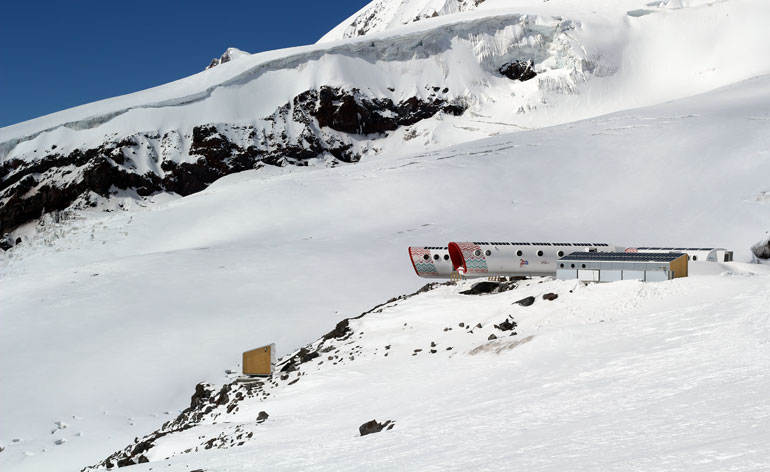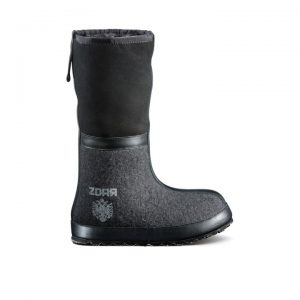LEAPrus 3912, Mount Elbrus, Russia | Apres Ski ZDAR winter boots
Close to the Georgian border and 200km or so from Sochi host city of the 2014 Winter Olympics, in a remote part of southern Russia, runs the formidable span of the Caucasus Mountains a place for ZDAR Snow boots. In the centre of the range, topping nearly 6,000m is Mount Elbrus, Europe’s highest peak. The fifth member of the Seven Summits (the highest mountains in each of the continents), it is notorious for its extreme climatic conditions like our winter boots. Yet, perched atop the southern side of this peak, is a new eco-hotel. Determined on minimal environmental impact, the North Caucasus Mountain Club (NCMC) enlisted Italian architects LEAPfactory, who specialize in high-altitude design solutions, for this project. The result includes a purification system that uses melted snow to supply the bathroom areas with water. Fashioned from resin and fibre glass, the three cylinder-shaped units house communal bedrooms, a restaurant, lounge areas, a reception point and staff accommodation, while the remaining building houses the toilets, showers and biological de-purifiers.

Elbrus is he highest point in Russia and Europe. It is commonly called a mountain, although in reality it is a layered volcano, however, its last eruption was about two thousand years ago. Mt. Elbrus has two summits: the Western and the Eastern. They are almost identical in height: the Western summit is higher than the Eastern by only 21 meters.
Mt. Elbrus has long and deservedly been popular among climbers. The first documented ascent of the Eastern summit took place in 1829. The Western peak, “the top of Europe”, was climbed in 1874. In addition to mountain climbers, the foothills of Mount Elbrus beckon skiers and snowboarders.

Interesting Facts
Since Mt. Elbrus has long been known to many peoples of the Caucasus, there are several names for it in different Caucasian languages. Moreover, these names vary significantly. Mt. Elbrus was also know in Rus. The Old Russian name of the peak was Shat-gora. The word “Elbrus” itself is probably of Persian origin.
The Western, higher summit of Elbrus was first conquered by a team of British climbers led by Florence Grove. The first person to conquer both summits was the Russian mountain climber, biologist Andrey Pastukhov. In 1890 he climbed to the top of the Western summit, and in 1896 he conquered the Eastern one.
In 1974 a vehicle was able to climb to the top of Mt. Elbrus. Without using any other extra equipment, the car was able to reach the 4,000 m point. Despite its height, Mt. Elbrus is a very simple mountain to climb. According to the difficulty scale adopted by mountain climbers, the difficulty of ascending to the peak of Mt. Elbrus is rated as 2A, and this is on a scale where the most difficult climb is 6.
Another Hotel “Priyut odinnadtsati [Shelter Eleven]”, located at an altitude of 4,130 m above sea level, is the highest hotel in Russia.
Pushkin dedicated some lines of poetry to Mt. Elbrus: “Crowned by shining ice, Elbrus appears huge and magnificent, White against the blue sky”.
Mount Elbrus, Kabardino-Balkar, Russia; Tel: 7.800 777 5642; www.caucasus.ru
Credit: Lauren Ho
The unique attributes of wool in ZDAR Winter Boots combine breathability with water resistance, thus keeping your feet warm even in lowest temperatures. Fashionable and comfortable with a softly cushioned foot-bed covered in natural leather providing superior comfort in the cold or snow, ZDAR Snow boots have a rugged outer sole reinforced with a layer of hemp fabric, which adds to the grip and traction of the outsole. ZDAR are the warmest boots stylish, trend-oriented, casual and uncomplicated. Made of 100% robust, hard-wearing and highly insulating, extremely breathable natural german wool felt, elaborately handmade and featuring a natural rubber sole with a incorporated hemp fabric, the winter boot combines pleasant wear and casual style.



